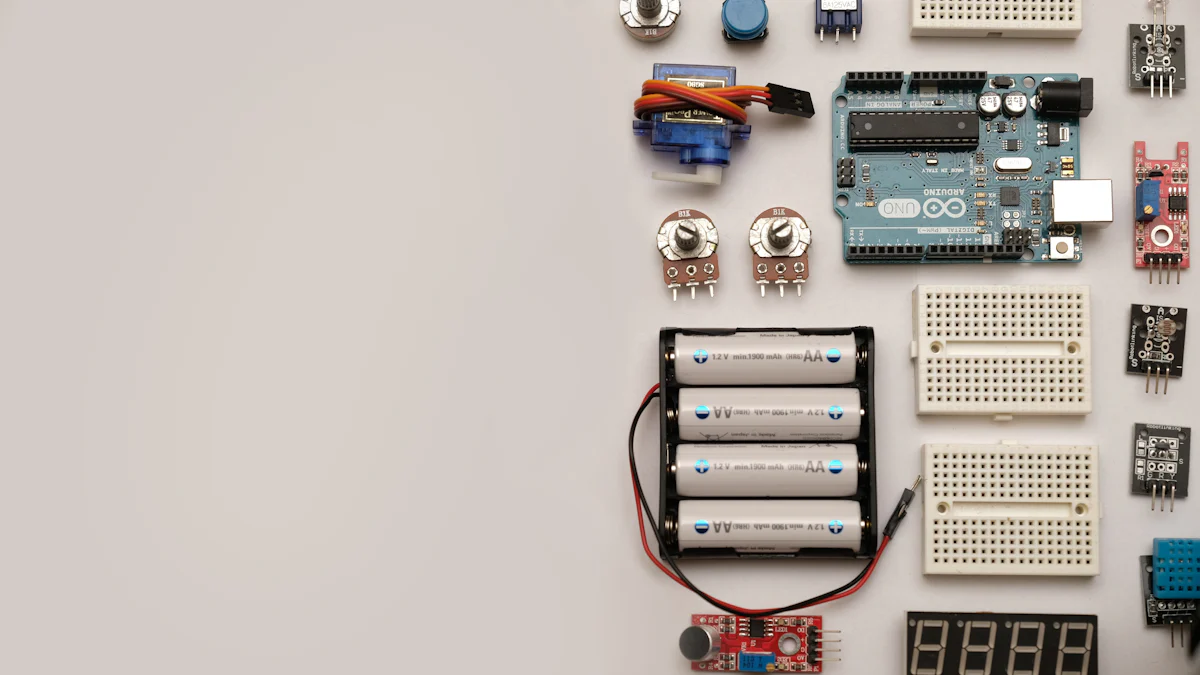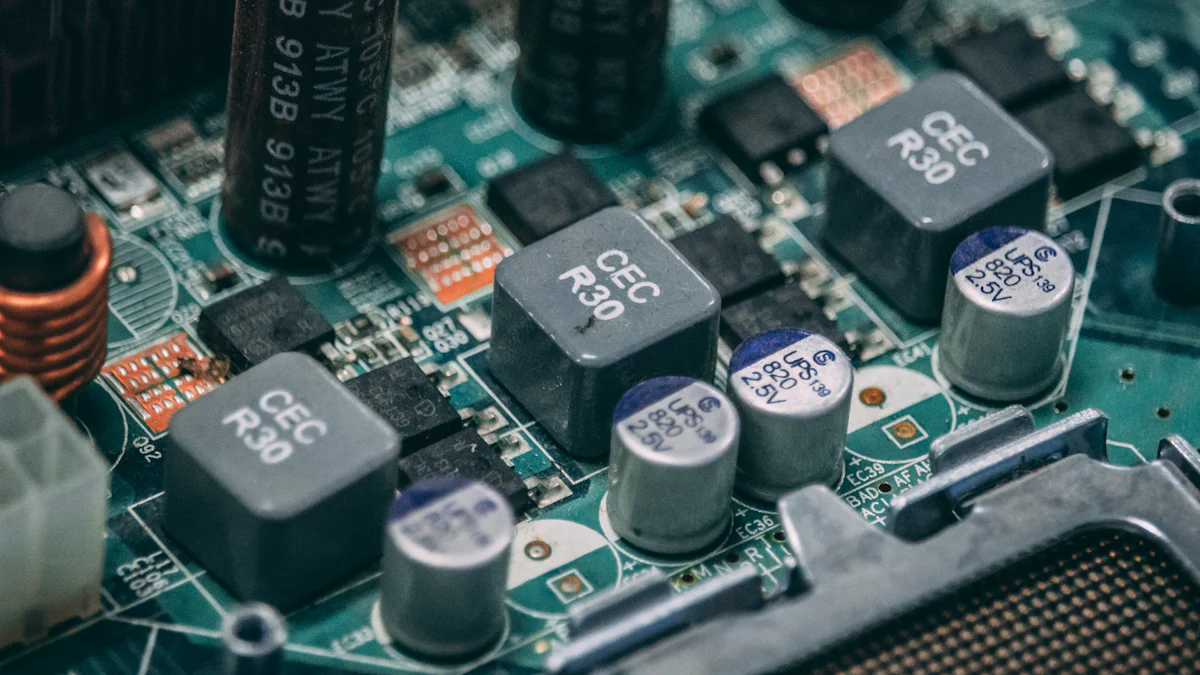Similar recommendations for ECS-F1HE475K components

When replacing the ECS-F1HE475K capacitor, you can consider several alternatives that meet similar specifications and provide similar recommendations. Some reliable options include capacitors with a 4.7 µF capacitance and a 50 V voltage rating, such as ECS-F1HE105K or ECS-F1HE225K. Selecting the right replacement requires careful attention to electrical performance, physical dimensions, and application compatibility. Matching these factors ensures the new component functions seamlessly in your circuit. Always consult datasheets and verify the specifications before making a final decision to avoid performance issues or compatibility concerns.
Key Takeaways
- When replacing the ECS-F1HE475K capacitor, consider alternatives like ECS-F1HE105K, ECS-F1HE225K, and ECS-F1HE106K, each offering unique capacitance and voltage ratings.
- Always consult datasheets to verify specifications such as capacitance, voltage rating, and tolerance to ensure compatibility with your circuit.
- Evaluate the physical dimensions and mounting type of replacement capacitors to avoid installation issues in space-constrained designs.
- Consider the environmental conditions your application will face; select capacitors with similar durability and resistance to humidity and temperature fluctuations.
- Testing and prototyping alternatives in a controlled environment can help identify potential issues and ensure reliable performance before full-scale implementation.
- Seek expert advice when faced with complex requirements or sourcing hard-to-find components to make informed decisions.
- Balance cost and quality by choosing reliable suppliers and avoiding cheaper alternatives that may compromise performance.
Recommended Alternatives to ECS-F1HE475K

When searching for alternatives to the ECS-F1HE475K capacitor, you must focus on components that align with its specifications. Below are three recommended options that can serve as reliable replacements.
Component A
The ECS-F1HE105K capacitor offers a 1 µF capacitance with a 50 V voltage rating. It is suitable for circuits requiring lower capacitance but similar voltage handling. This component works well in compact designs due to its small size and lightweight structure. Its conformal coating ensures durability in environments with high humidity or temperature fluctuations. You should consider this option if your application prioritizes stability and reliability over higher capacitance.
Component B
The ECS-F1HE225K capacitor provides a 2.2 µF capacitance and a 50 V voltage rating. This component bridges the gap between lower and higher capacitance needs. It is ideal for applications requiring moderate energy storage and discharge rates. Its robust design makes it compatible with industrial and consumer electronics. You can rely on this capacitor for consistent performance in demanding conditions. Always verify its dimensions to ensure it fits your circuit layout.
Component C
The ECS-F1HE106K capacitor delivers a 10 µF capacitance with a 50 V voltage rating. It is an excellent choice for circuits needing higher capacitance for energy storage or filtering purposes. This component supports applications with significant power fluctuations or noise suppression requirements. Its enhanced tolerance and thermal stability make it a dependable option for high-performance systems. You should evaluate this capacitor if your design demands greater energy handling capacity.
Always consult datasheets for detailed specifications before selecting a replacement. This ensures compatibility with your circuit's electrical and physical requirements.
By exploring these similar recommendations, you can find a suitable alternative to the ECS-F1HE475K capacitor. Each option offers unique benefits tailored to specific applications, helping you maintain optimal circuit performance.
Key Specifications of ECS-F1HE475K
Electrical Specifications
Capacitance and Voltage Ratings
The ECS-F1HE475K capacitor features a capacitance of 4.7 µF and a voltage rating of 50 V. These values make it suitable for circuits requiring moderate energy storage and stable voltage handling. You should ensure that any replacement matches these ratings to maintain consistent performance. A mismatch in capacitance or voltage could lead to circuit instability or even component failure.
Tolerance and Temperature Coefficient
This capacitor offers a tight tolerance range, ensuring precise performance in your circuit. Its temperature coefficient allows it to function reliably across a wide range of temperatures. You can depend on this component in environments with fluctuating thermal conditions. Always verify the tolerance and temperature coefficient of alternative components to avoid unexpected variations in performance.
Physical Characteristics
Size and Form Factor
The ECS-F1HE475K has a compact size, making it ideal for space-constrained designs. Its small form factor allows you to integrate it into modern electronic devices without compromising on space efficiency. When selecting a replacement, check the dimensions to ensure it fits seamlessly into your circuit layout.
Mounting Type and Material
This capacitor uses a surface-mount design, which simplifies installation and enhances durability. Its conformal coating provides additional protection against environmental factors like moisture and dust. You should prioritize alternatives with similar mounting types and protective materials to ensure compatibility and longevity.
Application Suitability
Common Use Cases
The ECS-F1HE475K is commonly used in applications such as power supply filtering, signal coupling, and decoupling. Its reliability and performance make it a popular choice for consumer electronics, industrial equipment, and automotive systems. You can rely on this capacitor for tasks requiring stable energy storage and noise suppression.
Environmental Considerations
This capacitor performs well in environments with high humidity, temperature fluctuations, or mechanical stress. Its robust design ensures consistent operation even in challenging conditions. When choosing a replacement, consider the environmental factors your application will face. Components with similar durability and resistance to environmental stress will help maintain the reliability of your circuit.
Understanding the key specifications of the ECS-F1HE475K helps you make informed decisions when selecting a replacement. Always compare these specifications with potential alternatives to ensure optimal performance and compatibility.
Criteria for Selecting the Right Alternative
When choosing an alternative to the ECS-F1HE475K capacitor, you must evaluate several critical factors. These criteria ensure the replacement component performs reliably and integrates seamlessly into your application.
Matching Electrical Specifications
Importance of Capacitance and Voltage
Capacitance and voltage ratings are the most crucial parameters when selecting a replacement. The ECS-F1HE475K offers a 4.7 µF capacitance and a 50 V voltage rating, making it suitable for moderate energy storage and stable voltage handling. You should prioritize alternatives with identical or closely matching values. A mismatch in these specifications can lead to circuit instability or even damage to other components.
For example, a lower voltage rating may cause the capacitor to fail under high voltage conditions, while a higher capacitance could disrupt the circuit's timing or filtering functions.
Ensuring Tolerance and Stability
Tolerance and temperature stability directly impact the capacitor's performance. The ECS-F1HE475K provides a tight tolerance range, ensuring consistent operation even in fluctuating conditions. When evaluating alternatives, you should confirm that the tolerance aligns with your circuit's requirements. Components with poor stability may introduce variations that affect the overall functionality of your design.
Compatibility with Application
Environmental and Thermal Considerations
The operating environment plays a significant role in determining the right capacitor. The ECS-F1HE475K is designed to withstand high humidity, temperature fluctuations, and mechanical stress. If your application involves similar conditions, you should select a replacement with comparable environmental resistance. Capacitors with conformal coatings or robust materials often perform better in challenging environments.
For instance, industrial applications may require capacitors that can endure extreme temperatures, while consumer electronics might prioritize compactness and moderate durability.
Physical Fit and Mounting Requirements
Physical dimensions and mounting types are equally important. The ECS-F1HE475K features a compact size and surface-mount design, making it ideal for space-constrained layouts. Before finalizing an alternative, you should verify its size and mounting compatibility with your circuit board. A mismatch in these aspects could complicate installation or compromise the device's structural integrity.
Availability and Cost
Sourcing Reliable Suppliers
Finding a trustworthy supplier ensures you receive high-quality components. You should research suppliers with a proven track record of delivering reliable products. Platforms like DigiKey and Electrical.com offer detailed datasheets and warranties, which can help you make informed decisions. Always check for customer reviews and return policies to avoid potential issues.
Balancing Cost and Quality
While cost is a significant factor, it should not come at the expense of quality. Cheaper alternatives may lack the durability or performance required for your application. You should aim to strike a balance between affordability and reliability. Investing in a slightly more expensive but dependable component can save you from future failures or replacements.
Remember, the right alternative not only matches the ECS-F1HE475K's specifications but also meets your application's unique demands. By carefully considering these criteria, you can ensure optimal performance and long-term reliability.
Comparison of Recommended Alternatives

Performance Comparison
Electrical Performance
When comparing the electrical performance of the recommended alternatives, you should focus on capacitance, voltage ratings, and stability. The ECS-F1HE105K offers a lower capacitance of 1 µF, which suits applications requiring minimal energy storage. The ECS-F1HE225K provides a middle ground with 2.2 µF, making it ideal for moderate energy demands. The ECS-F1HE106K, with its 10 µF capacitance, excels in high-energy storage or noise suppression tasks. Each alternative maintains the same 50 V voltage rating, ensuring compatibility with circuits designed for the ECS-F1HE475K. You must evaluate your circuit's specific needs to select the most suitable option.
Durability and Longevity
Durability plays a critical role in ensuring long-term reliability. The ECS-F1HE105K and ECS-F1HE225K feature robust conformal coatings, which protect against moisture and temperature fluctuations. The ECS-F1HE106K offers enhanced thermal stability, making it a dependable choice for high-performance systems. You should consider the environmental conditions of your application to determine which alternative provides the best longevity. For instance, industrial environments may demand components with higher resistance to mechanical stress.
Compatibility Comparison
Application Suitability
Each alternative capacitor serves different applications based on its specifications. The ECS-F1HE105K works well in compact designs where space is limited. The ECS-F1HE225K bridges the gap between low and high capacitance needs, making it versatile for consumer electronics. The ECS-F1HE106K supports high-energy applications, such as power filtering or noise suppression. You should align the alternative's capabilities with your circuit's functional requirements to ensure optimal performance.
Physical and Environmental Fit
Physical dimensions and environmental resistance are crucial for compatibility. The ECS-F1HE105K and ECS-F1HE225K share a compact form factor, making them suitable for space-constrained layouts. The ECS-F1HE106K, while slightly larger, compensates with superior thermal and mechanical durability. All three options use surface-mount designs, simplifying installation. You must verify the physical fit and environmental resilience of the chosen alternative to avoid integration issues.
Cost and Availability Comparison
Price Range
The cost of these alternatives varies based on their specifications. The ECS-F1HE105K, with its lower capacitance, typically costs less, making it a budget-friendly option. The ECS-F1HE225K offers a balance between price and performance. The ECS-F1HE106K, due to its higher capacitance and durability, may come at a premium. You should weigh the cost against your application's requirements to make an informed decision.
Supplier Options
Reliable suppliers like DigiKey and Electrical.com provide these alternatives with detailed datasheets and warranties. DigiKey offers competitive pricing and fast shipping, while Electrical.com ensures customer satisfaction with a two-year warranty. You should prioritize suppliers with transparent policies and positive reviews to avoid potential issues. Platforms with pay-per-use pricing models, similar to Qovery's approach, can also help you manage costs effectively.
Selecting the right alternative involves balancing performance, compatibility, and cost. By understanding these comparisons, you can make a confident choice that meets your circuit's unique demands.
Practical Tips for Choosing the Right Component
Consulting Datasheets and Manufacturer Guidelines
How to Read Datasheets
Datasheets provide essential information about a component's specifications and performance. To read them effectively, focus on key sections like electrical characteristics, physical dimensions, and environmental ratings. Start by identifying the capacitance, voltage rating, and tolerance. These values determine if the component matches your circuit's requirements. Next, review the temperature range and stability to ensure the capacitor performs reliably under varying conditions. Pay attention to the mounting type and size to confirm compatibility with your design.
Manufacturers often include graphs and tables in datasheets. Use these visuals to understand how the component behaves under different conditions, such as temperature or frequency changes.
Key Information to Look For
When evaluating datasheets, prioritize specific details that impact your application. Look for the component's equivalent series resistance (ESR), as it affects energy efficiency and heat generation. Check the ripple current rating to ensure the capacitor can handle the expected current without overheating. Review the lifespan or reliability data, especially if your application involves continuous operation. Always verify the manufacturer's part number to avoid confusion with similar components.
Reliable datasheets, like those provided by DigiKey or Electrical.com, include warranty details and sourcing information. These resources help you make informed decisions and ensure product authenticity.
Testing and Prototyping
Importance of Testing Alternatives
Testing ensures the selected component meets your circuit's performance and reliability standards. By evaluating alternatives in a controlled environment, you can identify potential issues before full-scale implementation. Testing also helps you compare the performance of different capacitors, such as their response to voltage fluctuations or thermal stress. This step minimizes the risk of failure and ensures long-term reliability.
Prototyping with alternatives allows you to simulate real-world conditions. This process helps you confirm that the replacement component integrates seamlessly into your design.
Tools and Methods for Prototyping
Use tools like multimeters and oscilloscopes to measure electrical parameters during testing. Multimeters help you verify capacitance, resistance, and voltage ratings, while oscilloscopes allow you to observe signal behavior. Circuit simulation software, such as SPICE, can model the capacitor's performance without physical testing. For physical prototypes, solder the component onto a test board and monitor its behavior under load conditions. Document your findings to compare results and select the best alternative.
Engineering aids, like the System Prototype Tool (SPT7835), streamline the testing process. These tools provide accurate measurements and insights, helping you evaluate components efficiently.
Seeking Expert Advice
When to Consult a Professional
Consulting an expert becomes crucial when you encounter complex requirements or unique challenges. Professionals can guide you in selecting components that meet specific criteria, such as high durability or precise tolerance. Seek advice if your application involves harsh environments, like extreme temperatures or high humidity. Experts can also help you interpret datasheets and recommend reliable suppliers.
For sourcing hard-to-find components, professionals often have access to specialized networks. They can assist in locating obsolete or long-lead-time parts, such as the ECS-F1HE475K.
Resources for Technical Support
Leverage resources like manufacturer support teams, online forums, and technical documentation. Platforms like DigiKey and Electrical.com offer customer support and detailed datasheets. Online communities, such as engineering forums, provide valuable insights from experienced professionals. Consider reaching out to local electronics suppliers or consulting firms for personalized assistance. These resources ensure you receive accurate information and make confident decisions.
Reliable support networks save time and reduce the risk of errors. They help you navigate challenges and select the right component for your application.
You now have several similar recommendations to consider when replacing the ECS-F1HE475K capacitor. Each alternative offers unique benefits, ensuring you can find a component that matches your circuit's needs. Always prioritize specifications, performance, and compatibility to maintain optimal functionality. Carefully review datasheets and evaluate the alternatives before making a decision. If needed, seek expert advice to ensure the best choice for your application. By following these steps, you can confidently select a reliable replacement and achieve long-term success in your projects.
FAQ
What is ECS-F1HE475K?
The ECS-F1HE475K is a tantalum capacitor known for its reliability and compact design. It features a capacitance of 4.7 µF and a voltage rating of 50 V, making it suitable for various electronic applications. Its conformal coating provides added protection against environmental factors like moisture and dust.
Where can I find technical information about ECS-F1HE475K?
You can access detailed technical information about the ECS-F1HE475K on trusted platforms like the Ariat Tech website. These resources often include specifications, performance details, and application guidelines to help you understand the component better.
Is there a datasheet available for ECS-F1HE475K?
Yes, a datasheet for the ECS-F1HE475K is available in PDF format. This document provides essential details such as electrical characteristics, physical dimensions, and environmental ratings. Reviewing the datasheet ensures you select the right component for your application.
What are the key specifications of ECS-F1HE475K?
The ECS-F1HE475K offers a capacitance of 4.7 µF and a voltage rating of 50 V. It features a tight tolerance range, ensuring precise performance. Its surface-mount design and conformal coating make it ideal for space-constrained and demanding environments.
Can I replace ECS-F1HE475K with another capacitor?
Yes, you can replace the ECS-F1HE475K with an alternative capacitor that matches its specifications. Ensure the replacement has a similar capacitance, voltage rating, and tolerance. Always consult datasheets and verify compatibility before making a decision.
What are some recommended alternatives to ECS-F1HE475K?
Some reliable alternatives include the ECS-F1HE105K, ECS-F1HE225K, and ECS-F1HE106K. Each option offers unique benefits, such as varying capacitance levels and robust designs. You should evaluate your circuit's requirements to select the most suitable replacement.
How do I ensure compatibility when selecting a replacement?
To ensure compatibility, compare the electrical specifications, physical dimensions, and environmental resistance of the replacement with the ECS-F1HE475K. Focus on matching capacitance, voltage rating, and mounting type. Testing the alternative in your circuit can also confirm its suitability.
Where can I purchase ECS-F1HE475K or its alternatives?
You can purchase the ECS-F1HE475K or its alternatives from reliable suppliers like DigiKey and Electrical.com. These platforms provide detailed datasheets, warranties, and customer support to help you make informed decisions.
Why is it important to consult datasheets before choosing a capacitor?
Datasheets provide critical information about a capacitor's performance, durability, and compatibility. By consulting datasheets, you can verify key specifications like capacitance, voltage rating, and tolerance. This step minimizes the risk of selecting an unsuitable component.
What tools can I use to test a replacement capacitor?
You can use tools like multimeters and oscilloscopes to test a replacement capacitor. Multimeters measure capacitance and voltage, while oscilloscopes analyze signal behavior. Circuit simulation software, such as SPICE, can also model the capacitor's performance before physical testing.
See Also
Top SMT45A-682 Models That Are Highly Rated
R1EX24002ASASOA: An Unexpected I2C Memory Option
Key Features To Know About SMT35A-102LF

